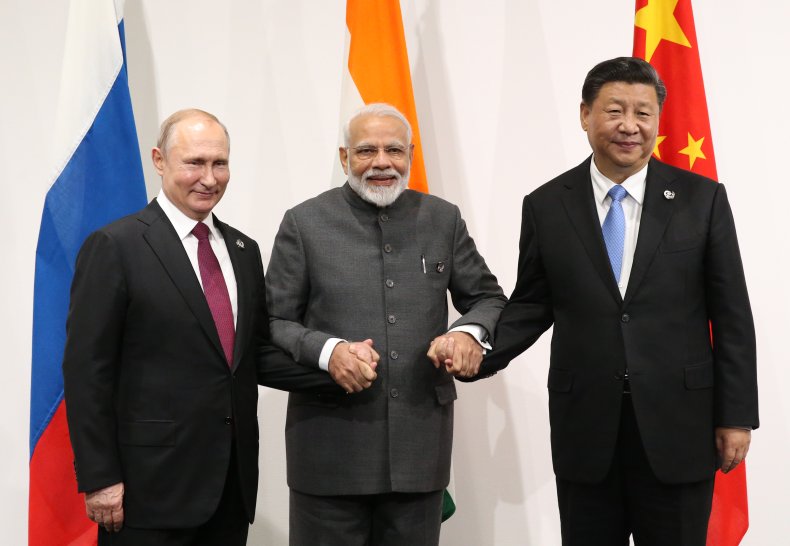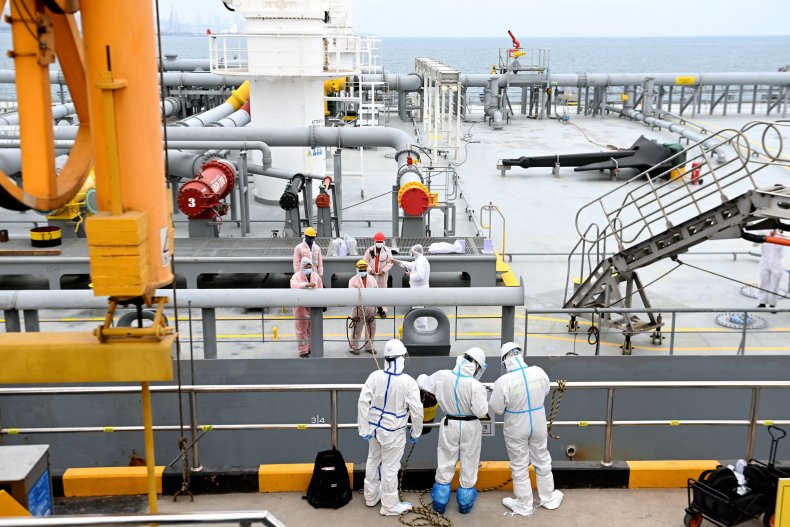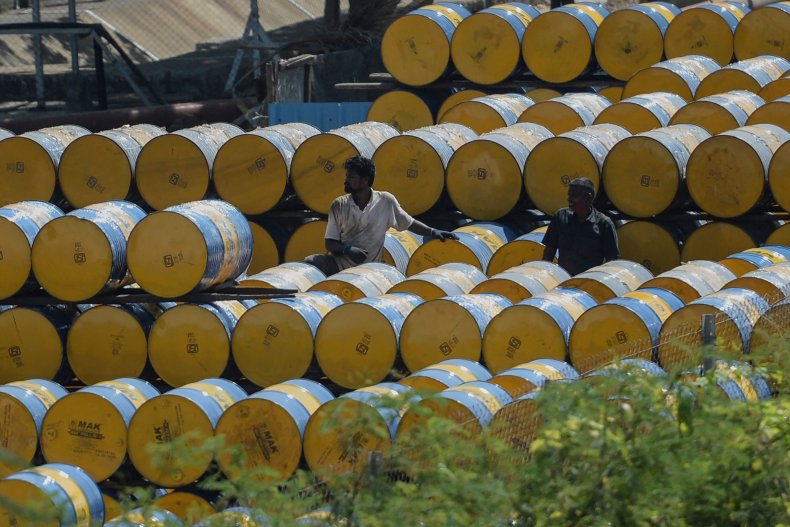TOM O'CONNOR
The United States and its European allies have launched a devastating campaign of sanctions against Russia over its war in Ukraine, cutting Moscow off from critical energy markets at a time when it needs capital to fuel the ongoing conflict.
But Russian President Vladimir Putin has been thrown a lifeline from Asian economic titans China and India, which have refused to join the sanctions, but have yet to be targeted for their dealings with Moscow, and have moved to buy more Russian oil than ever before.
The premise is simple: China and India buy what the European Union has largely banned, and at a lower rate. Just how much the two powers, themselves rivals in the region, are willing and able to offer, however, remains the subject of debate among experts.
Daniel Fried, a former U.S. ambassador to Poland who also served as coordinator for former President Barack Obama's sanctions program against Russia in the wake of the first outbreak of hostilities in Ukraine eight years ago, told Newsweek that, when it comes to Moscow's sanctions workarounds, it is "absolutely right to focus on China and India with respect to oil."
"And one of the big questions I have and some of my colleagues have is whether the U.S. or EU is going to act to try to complicate Russia's ability to divert its oil from Europe to China and India," he added.
Fried, who is currently a distinguished fellow at the Atlantic Council think tank in Washington, said that these sales would come "presumably with a discount," but "the price of oil is so high" that without secondary sanctions targeting third-party importers, "the Russians will make bucket loads of money."
"The immediate question is what arrangements are going to be made for oil purchases and what additional restrictions can the EU and the U.S. put on," he added. "Russia will lose substantial amounts of income unless China and India make up for the shortfall, which they will not do entirely."
 Russian President Vladimir Putin (L), Indian Prime Minister Narendra Modi (C) and Chinese President Xi Jinping (R) pose for a group photo prior to their trilateral meeting at the G20 Osaka Summit 2019 on June 28, 2019 in Osaka, Japan.MIKHAIL SVETLOV/GETTY IMAGES
Russian President Vladimir Putin (L), Indian Prime Minister Narendra Modi (C) and Chinese President Xi Jinping (R) pose for a group photo prior to their trilateral meeting at the G20 Osaka Summit 2019 on June 28, 2019 in Osaka, Japan.MIKHAIL SVETLOV/GETTY IMAGESAs to whether this shortfall might convince Putin to change his calculus on the conflict, Fried said that "sanctions are not entirely about changing behavior," but also "to weaken the adversary."
The Biden administration spoke publicly to this goal.
"We want to see Russia weakened to the degree that it can't do the kinds of things that it has done in invading Ukraine," U.S. Defense Secretary Lloyd Austin told reporters last month.
And while Fried said the objective was to convey a message to the Kremlin to "get the best deal you can rather than crowing about how you're going to make the Ukrainians fall to their knees and surrender," the concern in Moscow was that Washington and its allies saw sapping their rival's strength as a prevailing geopolitical aim, making the need to offset some of the most important losses, namely in the all-important energy sector, all the more urgent.
On Thursday, Russian Security Council Secretary Nikolay Patrushev told the newspaper Rossiyskaya Gazeta that in the course of his duties, "special emphasis is placed on the development of measures aimed at stalling Western attempts to provoke a full-scale economic crisis in Russia with a potential to exacerbate the social situation in the country."
Putin spoke further to this aim when addressing Patrushev and the Security Council the following day.
"The situation in the world remains complex and hardly predictable, and there persist old and appear new challenges and risks," the Russian leader said. "In these conditions, it is necessary more actively to look for and introduce approaches that meet realities of the time and contribute to strengthening security and stability of our state and its consistent and progressive development."
While Putin has doubled down on his vow to resist Western pressure, the long-term effects of the restrictions on the Russian economy remain unclear.
"There are no indications that Western sanctions have forced Russia to back off in Ukraine so far," Artyom Lukin, deputy director for research at Far Eastern Federal University's School of Regional and International Studies in Vladivostok, told Newsweek. "However, it takes a while for sanctions to take full effect. No one can confidently predict what impact the sanctions will ultimately have on Russia's economy and society."
"And, for that matter," he added, "how outlawing one of the major global natural resource providers is going to affect the rest of the world."
One potential outcome is a lasting realignment of global energy trade in which Russia's massive oil market focuses primarily on China. But whether "China could absorb the oil and gas that Russia currently supplies to Europe," Lukin said, remains "the most significant question."
"If Russia doesn't find the way to re-orient its oil and gas flows to the east, it would deprive Moscow of roughly half of its export revenues in three to five years from now," he said. "To redirect the oil and gas flows to Asia — and China, of course, is the biggest Asian market — infrastructure, such as pipelines and port terminals, need to be put in place."
As Lukin points out, those changes would need to be put in place relatively soon, as those types of projects take many years to complete. One particular endeavor he highlighted was the planned "Power of Siberia-2" pipeline that would supplement the original route opened in 2019 to bring more Russian gas to China.
"If it is not signed by the year's end," Lukin said, "that would be a bad sign for Moscow."
So far, he said China has displayed a mixed record on expanding economic ties with Russia since the war in Ukraine broke out nearly 100 days ago. As Beijing seeks to portray itself as neutral in the political sphere, the People's Republic has adopted a relative middle ground when it comes to overall trade.
"On the one hand, China has denounced Western sanctions against Russia," Lukin said. "On the other hand, China has de facto complied with some of the sanctions the U.S. and the EU have imposed on Moscow."
"Beijing is fearful that running afoul of the sanctions would cost it dearly in terms of access to the U.S.-dominated global financial system and Western technology," he added.
So while larger Chinese companies play a cautious hand, Lukin predicted a trend in which "smaller Chinese businesses, those with less or zero international exposure, will be increasingly important in serving as conduits for Sino-Russian trade."
Wang Huiyao, founder and president of the Center for China and Globalization in Beijing, explained why China was opposed to the Western economic efforts against Russia.
"I think China is against sanctions in general because the world is still suffering from Pandemic recessions and energy price hike caused by sanctions on Russia can cost China billions of dollars in losses," Wang told Newsweek. "as, in China, more than 70% of energy depends on imports."
As such, he stabilizing global trade relations was imperative not only for China but the international community as a whole.
"China just conducts normal trade activities with Russia as China has denied any military or economic assistance to Russia," Wang said. "The world needs normal trade and we should prevent the world plunge into a recession caused by prolonged pandemic and Russia Ukraine war."
"China, US and EU as largest economies in the world,", he added, "have a moral responsibility to prevent the world suffering from food crisis and hundreds of millions people pushed back into poverty."
 Immigration inspection officers check an oil tanker carrying imported crude oil at Qingdao port in China's eastern Shandong province on May 9. China is the world's top crude oil importer, taking in more than twice that of the United States and roughly three times that of India each year.AFP/GETTY IMAGES
Immigration inspection officers check an oil tanker carrying imported crude oil at Qingdao port in China's eastern Shandong province on May 9. China is the world's top crude oil importer, taking in more than twice that of the United States and roughly three times that of India each year.AFP/GETTY IMAGESIndia, for its part, may have less to offer than China, but the country is also viewed as more critical to Biden's broader goals, one of them being the "Indo-Pacific" framework that is largely rooted in a bid to offset Beijing's influence in the region.
Brahma Chellaney, a professor at the Centre for Policy Research in New Delhi, said India's role in the overarching U.S. strategy allowed Washington to overlook close ties between New Delhi and Moscow, including defense purchases that included the Russian S-400 surface-to-air missile system.
"Despite U.S. policy compelling Russia to pivot to China, Moscow is helping India to shore up its defenses against China at a time when Himalayan military standoffs have raised the specter of war," Chellaney told Newsweek. "The supply of the S-400 system is one such example of Russia aiding India's deterrent strategy against China. This also explains why Washington is willing to look the other way over the S-400 supply."
This view was echoed by Gaurav Arya, a retired Indian Army major who now serves as editor-in-chief of the Chanakya Forum in New Delhi. He said India's importance was reinforced by its place in the Quadrilateral Security Dialogue with the U.S., Australia and Japan.
"The Quad needs India to counter China, and for its own geostrategic reasons, with a little push from history, India is willing to counter China militarily," Arya told Newsweek.
"The U.S. understands India's position and feels that India needs to be gently weaned away from Russian military equipment over a period," he added. "At the same time, the U.S. realizes that India is pushing back China, militarily, diplomatically and economically. In the entire scheme of things, S-400 is a small blip."
While Russian weapons have long served as the backbone of India's military infrastructure, a dynamic dating back to the Cold War, energy imports have been minimal, at least up until the outbreak of the conflict in Ukraine. Since then, these imports have risen dramatically, and the country's surplus refining capacity means it can serve as a hub to sell the end product back to the West.
"India's quest for new sources of crude oil is not just about diversification and refinery economics but also to a large extent, a supply chain resilience issue," Arya said. "Russian crude oil may not help India to benefit as a refining hub, but makes economic and geostrategic sense to India's planners."
Like China, India has been careful to balance its growing major power relations with a sense of independence in its foreign policy track.
Nandan Unnikrishnan, a distinguished fellow at the Observer Research Foundation in New Delhi, told Newsweek that "Russia's actions against Ukraine undoubtedly have complicated the geopolitical scenario for India, but New Delhi is not going to forgo opportunities that help deal with the developmental challenges that India faces, given that India's principal challenges are primarily domestic."
Though, he said this has led to "an uptick in acquisition of Russian energy," he noted that "this still isn't anywhere close to what the West continues to buy from Russia even today."
The EU's oil ban has restricted imports of Russian oil by ships but has allowed pipelines to keep flowing to countries like Hungary, a NATO nation that relies heavily on Russian oil, and whose leader, Prime Minister Viktor Orbán, has enjoyed a close relationship with Putin.
Meanwhile, Unnikrishnan said that "India has refineries both in the private and government sector that are capable of refining Russian oil," and sanctions have yet to impede their sale abroad.
"So far, I haven't heard of difficulties faced in terms of selling these refined products," he added. "There could be hurdles that may crop up in the future, and the Indian refining industry will have to decide how to deal with these barriers if and when they arise."
 A worker stacks oil barrels at a filling station in Chennai, India on February 24, the day Russian President Vladimir Putin launched what he called a "special military operation" against Ukraine, where conflict continues to this day.ARUN SANKAR/AFP/GETTY IMAGES
A worker stacks oil barrels at a filling station in Chennai, India on February 24, the day Russian President Vladimir Putin launched what he called a "special military operation" against Ukraine, where conflict continues to this day.ARUN SANKAR/AFP/GETTY IMAGESEven as China and India appear diplomatically coy in embracing Russian energy in the midst of the Ukraine conflict, their trade figures prove otherwise.
Danil Bochkov, an expert at the Russian International Affairs Council in Moscow, pointed to record trade numbers with both countries.
"Russia-China bilateral trade has demonstrated a record spike in May for the first four-month of the year due to the rise in energy prices, China's increased demand for Russian energy goods, as well as Beijing's desire to store some extra volumes amid hefty discounts for Russian oil and gas," Bochkov told Newsweek. "Similar dynamics are equally applied to India."
Bochkov argues that in the end, economics will determine outcomes.
"Here, economics trumps politics," he said, "since both Beijing and Delhi shun Western sanctions by avoiding direct purchases from Russia and turning to alternative channels such as reloading at sea and blending different crudes to dilute Russian oil origins."
China and India have also both explored doing business with Russia based on their respective natural currencies, rather than the U.S. dollar. Bochkov noted that ruble-yuan exchanges increased some 12 times between February and May of this year.
"So, even though neither India nor Beijing has directly sided with Russia politically," Bochkov said, "economically, they turn the current circumstances to their own advantage which also helps Russia to continue earning revenues from energy exports amid EU extending embargoes."
No comments:
Post a Comment